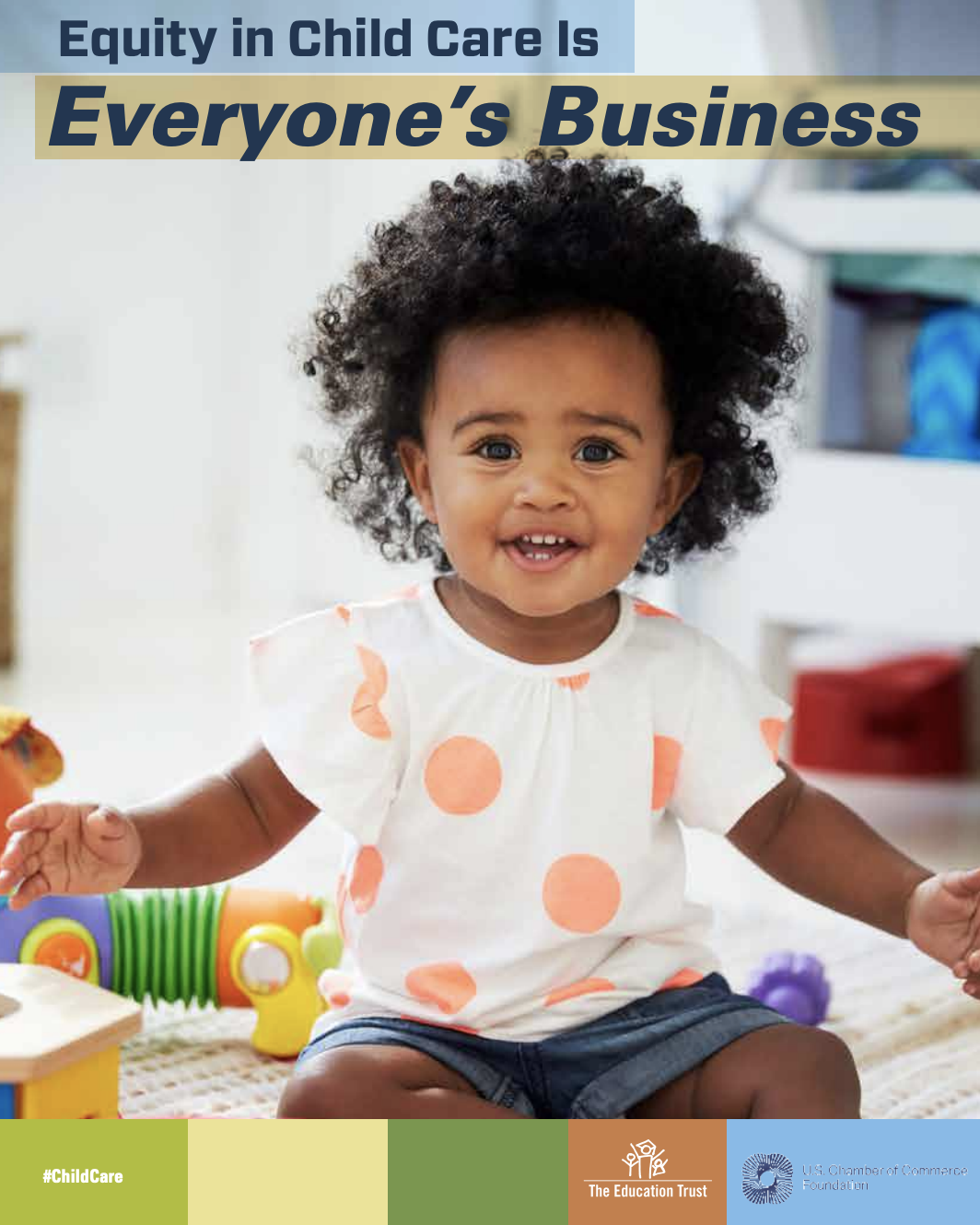
Photo: report screenshot
Both before the pandemic and now, child care providers of color have faced troubling and persistent racial inequities.
A new report – “Equity in Child Care is Everyone’s Business†— explores this challenge and proposes solutions. An accompanying policy brief is posted here.
Released by the U.S. Chamber of Commerce Foundation and The Education Trust, a national nonprofit, the report is a chronicle of unfair economic realities.
“Amid the COVID-19 crisis, child care providers, many of whom are women of color, face funding challenges, safety and health concerns, and talent acquisition/professional development barriers,†the report says. “Several providers reported that racial and gender bias has posed challenges within their local business community, including feeling less supported than other businesses due to their race.â€
Specific findings include:
• “In 2015, more than 1 in 6 female child care workers lived below the poverty line (that’s twice the poverty rate of female workers overall), and Black and Latina child care workers with children of their own were more than twice as likely to live below the poverty lineâ€
• “59% of all home-based child care workers have household incomes below the national median, and this number is 75% for Black home-based child care workers,†and
• “Black early educators earn an average of 78 cents less per hour than their White counterparts, even when controlling for education levelâ€
These disparities are the result of complex forces, the report says, noting:
“Because of systemic, historical, and institutionalized racism and sexism, child care providers — many of whom are women of color — face a variety of challenges. These challenges are specific to each facet of their identity — race, ethnicity, gender, and profession — and also exist at their intersections.â€
To identify strategies that can help, the report draws on feedback from early educators as well as from state and local Chamber of Commerce leaders.
Addressing these issues is crucial for children — and everyone else.
“Early care and education take place during one of the most crucial times in a child’s development and supporting the female child care workers of color doing so much of this work is critical for families, for the economy, and for our nation as a whole,†Carrie Gillispie, senior research associate at The Education Trust, says in a press release.
“Stronger connections between chambers of commerce and child care providers have the potential to address long-standing as well as pandemic-driven inequities, benefiting entire communities in the process.â€
The report adds:
“State and local chambers should begin by seeking input from local female providers of color about the challenges they are facing, the supports they need, and the programs they are offering, while employers can collect information about their employees’ child care needs and preferences.â€
The report also points to strategies that could help, including:
• increasing early education programs’ access to funding by focusing on grants, instead of loans that have to be paid back
• increasing the support and technical assistance provided by local chambers of commerce. Chambers can connect providers to health insurance options and to health and safety resources
• encouraging industries to “support employees who work nontraditional hours by investing in child careâ€
• encouraging child care providers to join local chambers of commerce and offering them a discounted membership rate so they can afford to do so
• having chambers and providers collaborate on networking and marketing efforts, especially for providers who want to boost their enrollment, and
• having chambers and providers work together on advocacy and on outreach to legislative leaders
While the pandemic and long-standing racism have been corrosive, there is, as the report notes, exciting progress that can be made by tapping into the existing business resources of chambers of commerce and forming creative partnerships that help children, families, child care providers, businesses that hire parents, and the economy.

Although I believe in racial equality, I have been in the field of early childhood for 35 years, and even now, as the owner of a center, I live below the poverty level and I am white. My husband was Hispanic, so my children are Biracial, so I am sensitive to everyone’s feelings on equality. Based on my observations in the field of early education over the years, most parents feel we are glorified baby sitters no matter what our race. I remember back in the 80s going to school for early childhood, a professor said in time this perception will change and the field will be viewed on a professional level. Unfortunately I have not seen that change, and as a result most of us in the field working as teachers live below the property level no matter what our race is. I thought in 2022 we would see some type of change in the field of early childhood education for those of us who are responsible for helping young minds develop to their full potential. There needs to be change in the way early childhood education is viewed in our society in order for all teachers in the field to be able to live above poverty level.